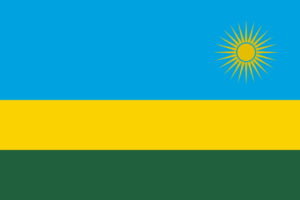Rwanda has been inhabited by tribal people for thousands of years. In the 1400s, a monarchy appeared in the country, led by King Tutsi. They called the king mwami. There are two distinct classes of people: Tutsi and Hutu. The Tutsis represent the royal family, while the Hutu are the lower class. The Tutsi lords owned the land while Hutu peasants worked on it. In 1894, a German named Count Von Goetzen was the first European to visit Rwanda. In 1899, the Mwami kings of Rwanda agreed to become a German protectorate. A few years later, in 1915, Belgium took control of the country.
In 1959, a Hutu revolution overthrew the Tutsi monarchy and came to power. For the next few years, things did not go well for the Tutsis. Many people have been killed and many more have fled the country. In 1990 there was a civil war between the two groups and the situation got worse until 1994 when something terrible happened. The government led by the Hutus tried to exterminate all Tutsis. This is called genocide. More than 800,000 Tutsis were killed and millions more had to flee the country.
| Capital | Kigali |
| Population | 14,151,073 (Source: 2023 worldometer) |
| Major Cities | Kigali (capital), Gisenyi, Butare, Gitarama, Ruhengeri, Byumba, Cyangugu, Kibuye, Rwamagana |
| Borders | North by Uganda, East by Tanzania, South by Burundi, and to West by the Democratic Republic of the Congo (Kinshasa) and Lake Kivu |
| Gross Domestic Product (GDP) | $13,312,796,765 (2022 worldometer) |
| Currency | Rwandan franc (RWF) |

Rwanda Major Industries: cement, agricultural products, small-scale beverages, soap, furniture, shoes, plastic goods, textiles, cigarettes
Rwanda Agricultural Products: coffee, tea, pyrethrum (insecticide made from chrysanthemums), bananas, beans, sorghum, potatoes; livestock
Rwanda Natural Resources: gold, cassiterite (tin ore), wolframite (tungsten ore), methane, hydropower, arable land
Rwanda Major Exports: coffee, tea, hides, tin ore
Rwanda Major Imports: foodstuffs, machinery and equipment, steel, petroleum products, cement and construction material
Total Size of Rwanda: 26,338 km² (source: wikipedia)
Geographical Low Point of Rwanda: Rusizi River 950 m
Geographical High Point of Rwanda: Volcan Karisimbi 4,519 m
Climate of Rwanda: Temperate; two rainy seasons (February to April, November to January); mild in mountains with frost and snow possible
General Terrain of Rwanda: mostly grassy uplands and hills; relief is mountainous with altitude declining from west to east
World Region or Continent of Rwanda: Africa
Geographical Coordinates: 2 00 S, 30 00 E
Rwanda Government Type: republic; presidential, multiparty system
Rwanda Nationality: Rwandan(s)
Rwanda National Holiday: Independence Day, 1 July (1962)
Rwanda Independence: 1 July 1962 (from Belgium-administered UN trusteeship)
Rwanda National Symbol:
Rwanda National Anthem or Song: Rwanda nziza (Rwanda, Our Beautiful Country)
Rwanda Languages Spoken: Kinyarwanda (official) universal Bantu vernacular, French (official), English (official), Kiswahili (Swahili) used in commercial centers
Rwanda Religions: Roman Catholic 56.5%, Protestant 26%, Adventist 11.1%, Muslim 4.6%, indigenous beliefs 0.1%, none 1.7% (2001)
Rwanda is often referred to as the “Heart of Africa” due to its central location on the African continent. It is also known as the “country of a thousand hills”, in reference to its hilly landscape. It is a beautiful and fascinating country with rich history and culture.
Its beautiful scenery and wildlife make it a popular tourist destination. It is home to the mountain gorillas, an endangered species as well as many other animals. If you ever visit, you won’t be disappointed.
Rwanda is a culturally diverse country, strongly influenced by Africa and the West. The official languages of Rwanda are French, English and Kinyarwanda, and the country is home to many ethnic groups.
Rwanda is known as the “Land of a Thousand Hills”. And no surprise: the country is full of mountains, with an average elevation of about 1,500 meters (4,900 feet).
Rwanda is home to some of the world’s last remaining species of mountain gorillas. These endangered primates are a big draw for tourists, and the country has gone to great lengths to protect them. Rwanda is one of the most densely populated countries in Africa. With a population of over 12 million, it is about the same size as Massachusetts, but with only 26,338 square kilometers of territory (compared to Massachusetts’ 27,360 square kilometers).
Rwanda is one of the poorest countries in the world, with a per capita income of just $700. However, the country has made great progress in recent years and its economy is growing rapidly. Rwanda is also one of the fastest growing economies in Africa, with real GDP growth of 8.6% in 2016.
Rwanda is a predominantly Christian country, with about 60% of the population following the Catholic Church. Protestantism is widespread, as are Muslims.
The official languages of Rwanda are French, English and Kinyarwanda. However, Kinyarwanda is by far the most widely spoken language, with around 90% of the population using it as a mother tongue.
Rwanda is one of the safest countries in Africa. The crime rate here is very low and the residents here are known for their hospitality and friendliness.
Community is also very important in Rwanda. Rwandans often live in close-knit communities and work together to support each other. This sense of community is what makes Rwanda a special place.
Religion plays an important role in Rwandan culture. Most Rwandans are Catholic and the religion plays an important role in daily life. Rwandans often come together to perform religious ceremonies and celebrations and use religion to connect with their culture.
Rwandan music is diverse, influenced by both Africa and the West. Rwandan musicians often blend traditional African instruments with Western musical styles to create their own unique sound. Rwandan music is generally very lively and vibrant, often used to celebrate important occasions. Rwandan music is an important part of the country’s culture and people of all ages love it.

